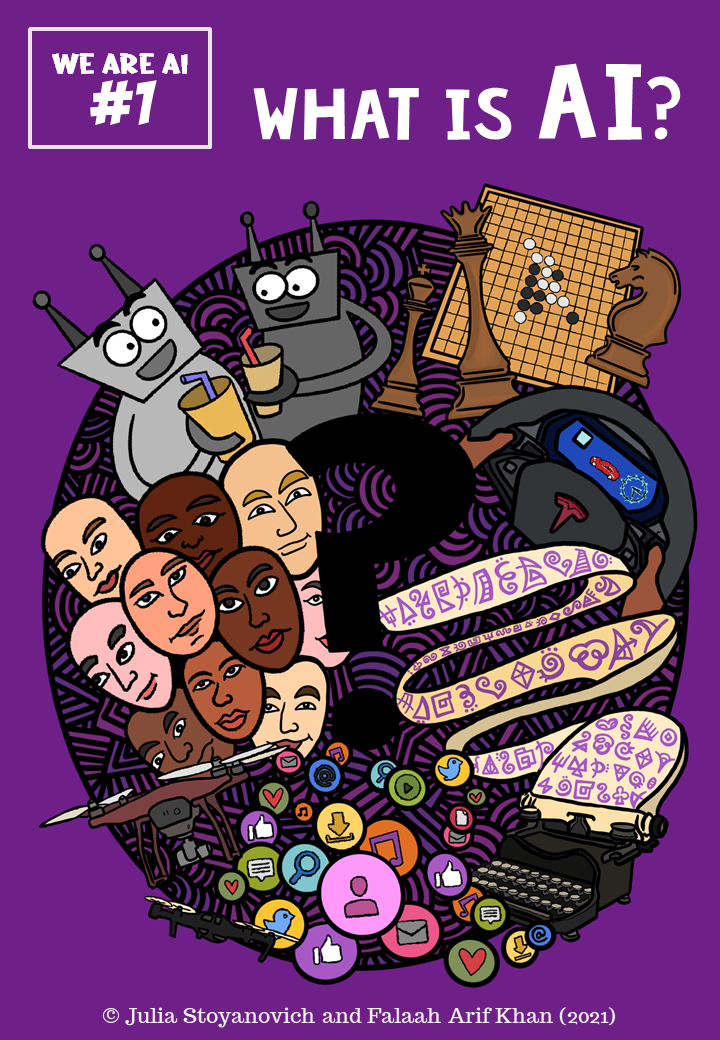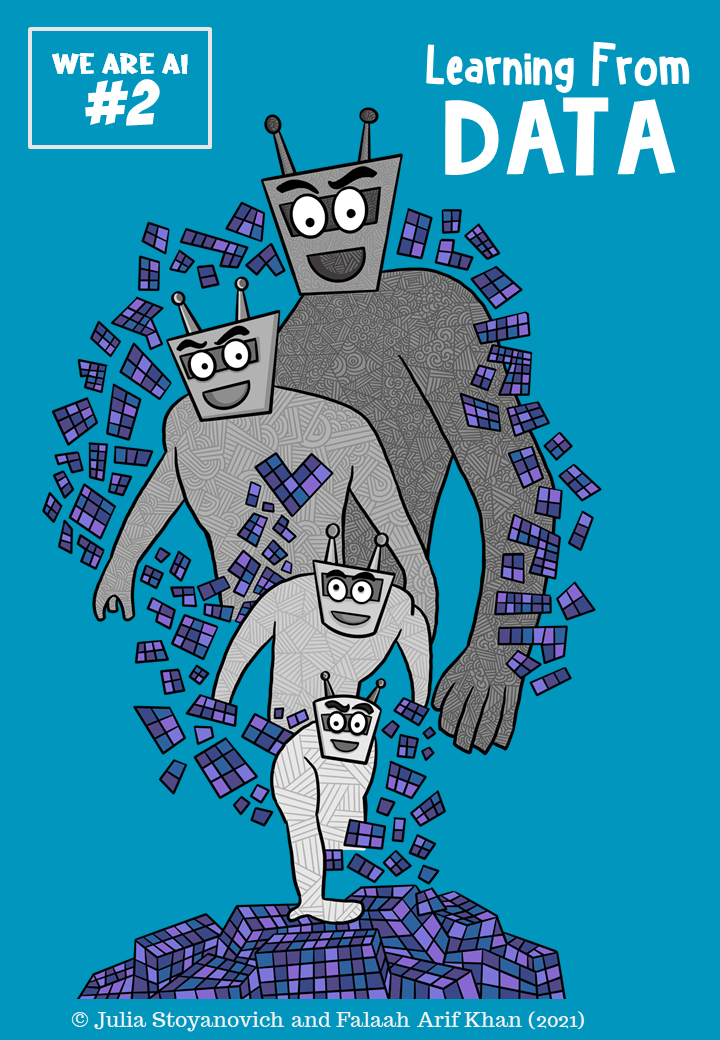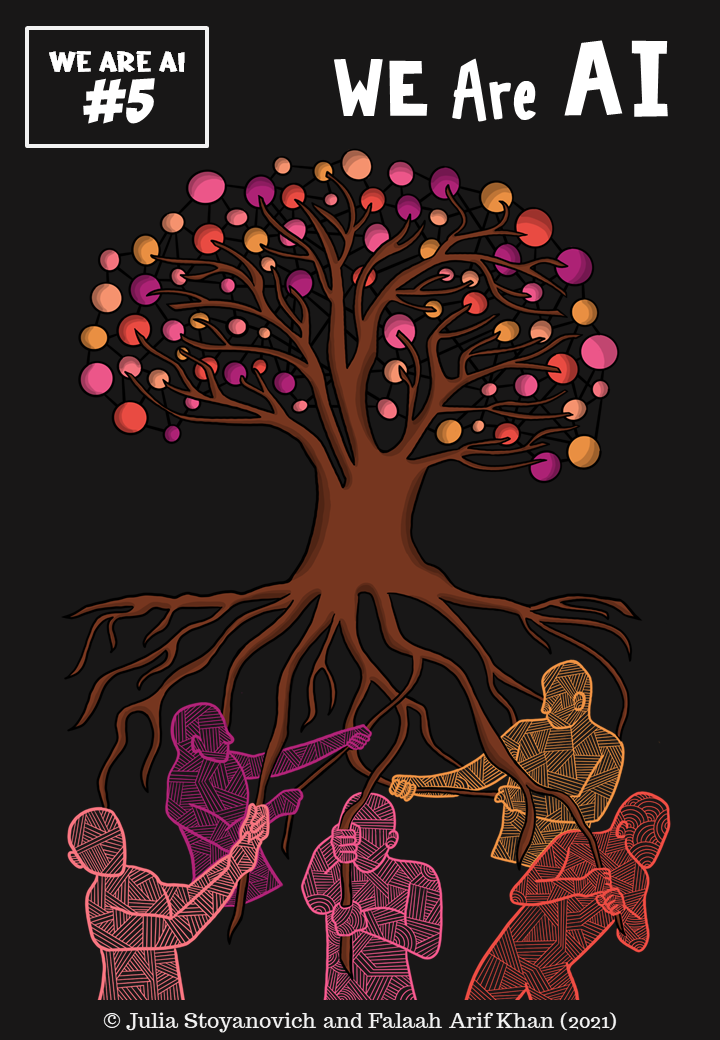Module 1: Understanding AI Fundamentals
| Site: | OpenLearn Create |
| Course: | Trustworthy and Democratic AI - Fundamentals |
| Book: | Module 1: Understanding AI Fundamentals |
| Printed by: | Guest user |
| Date: | Tuesday, 3 March 2026, 8:29 PM |
Description
In this learning course, we unravel the intricacies of AI, demystifying the algorithms that govern its decision-making processes. More importantly, we delve into the crucial concept of trustworthiness – an essential pillar that ensures AI serves humanity responsibly.
In Module 1, we cover the following Lessons:
Lesson 1.1: What is Artificial Intelligence?Lesson 1.2: The Role of AI in Society
Lesson 1.3: The Scope of Trustworthy AI
Lesson 1.4: The Importance of Ethical AI
LESSON 1.1: WHAT IS ARTIFICIAL INTELLIGENCE?
In the initial lesson, we will acquaint ourselves with the concept of Artificial Intelligence (AI), examining a range of examples and seeing where it’s used. Artificial Intelligence (AI) refers to the development of computer systems that can perform tasks that typically require human intelligence. These tasks encompass learning, reasoning, problem-solving, perception, and language understanding. AI systems often utilize machine learning algorithms, enabling them to adapt and improve their performance over time as they process and analyze data. Applications of AI range from virtual assistants like Siri and Alexa to complex tasks such as image recognition, natural language processing, and strategic decision-making in various industries. The ultimate goal of AI is to create machines that can simulate human intelligence and perform tasks autonomously.
Watch the video lecture accompanied with slides to learn more about fundamentals of AI.
In addition, watch additional video lectures introducing machine learning and deep learning:
Also, look at these short comics, presenting AI, algorithms and predictions:
 Volume 1: What is AI?
Volume 1: What is AI?
 Volume 2: Learning From Data
Volume 2: Learning From Data
 Volume 3: Who lives, Who dies, Who decides?
Volume 3: Who lives, Who dies, Who decides?
LESSON 1.2: THE ROLE OF AI IN SOCIETY
In our daily lives, the impact of Artificial Intelligence (AI) is unmistakable. AI has significantly contributed to the transformation of our society into a digitalized landscape. Its capabilities empower us to efficiently gather, handle, and scrutinize vast datasets at unprecedented speeds. Consequently, this technological advancement has given rise to innovative technologies, enhanced organizational workflows, and heightened operational efficiency across various industries.
From personalized recommendations on streaming platforms to predictive text in messaging apps, AI algorithms continually refine user experiences. Moreover, AI has revolutionized healthcare by facilitating quicker and more accurate diagnoses through advanced image analysis and predictive analytics. In the business realm, AI-driven automation streamlines processes, reducing manual effort and enhancing overall productivity. As AI continues to evolve, its role in shaping the fabric of our digital society becomes increasingly profound, offering solutions and insights that were once beyond imagination.
In the domain of public administration, AI is making significant strides in improving citizen services. Chatbots powered by natural language processing enhance public interactions, providing instant responses to inquiries and simplifying access to information. Additionally, AI algorithms are employed for predictive analytics in resource allocation, helping governments anticipate and address issues such as traffic management or public service demand. In Europe, countries like Estonia have implemented e-Governance solutions, using AI to streamline administrative processes and enhance the efficiency of public services. These advancements underscore how AI is reshaping the public sector, fostering better citizen engagement and optimizing government operations.Comic book titled We are AI will get you a short insight.
LESSON 1.3: THE SCOPE OF TRUSTWORTHY AI
In the rapidly advancing world of AI, ensuring trust and ethical considerations are paramount. This lesson will explore the dimensions that make AI systems trustworthy, covering key principles.
As AI continues to integrate into various aspects of our lives, understanding the scope of trustworthy AI is essential. By grasping the ethical principles, transparency requirements, and fairness considerations, we can actively contribute to the responsible development and adoption of AI technologies. For AI systems that inspire confidence and align with the values of a responsible, technology-driven society, the basis lay in these key concepts:
- Ethical Considerations: Understanding the ethical implications of AI is crucial. AI systems can impact privacy, bias, and human rights, that is why we need to discuss the ethical frameworks guiding the development and deployment of AI technologies.
- Transparency and Explainability: Trustworthy AI demands transparency. That is why it is so important making AI algorithms understandable and interpretable, allowing users to comprehend how decisions are made and fostering accountability.
- Accountability and Responsibility: The significance of holding individuals and organizations accountable for AI systems' outcomes due to legal and ethical responsibilities in the development, deployment, and maintenance of AI technologies.
- Fairness and Bias Mitigation: Exploring methods to ensure fairness in AI systems by addressing biases, promoting inclusivity and fairness in AI applications.
If interested in more, exploit the tools for implementing trustworthy AI from OECD (2021, text and video) and read the Ethics guidelines for trustworthy AI from the European Commision (2019)
LESSON 1.4: THE IMPORTANCE OF ETHICAL AI
The ethical imperative recognizes the transformative potential of AI and emphasizes the need to prioritize ethical considerations, respecting human values, rights, and dignity while avoiding harmful or biased outcomes.The term "ethical imperative" underscores the idea that ethical considerations should be at the forefront of decision-making when developing and implementing AI systems. It acknowledges that, in the rapidly evolving field of AI, there are ethical challenges and dilemmas that need to be addressed to ensure that technology is used for the benefit of individuals and society as a whole.
The ethical imperative in AI refers to the moral obligation to align actions with established ethical principles, values, and norms. It emphasizes the crucial responsibility to develop, deploy, and use AI in ethically responsible ways that respect human rights and societal values. This imperative underscores the central role of ethical considerations in decision-making within the evolving field of AI, addressing challenges and dilemmas for the technology's beneficial use. Key aspects include ensuring privacy, promoting fairness, transparency in AI systems, accountability for outcomes, human oversight, beneficence, and obtaining informed consent.
- Privacy and Data Protection: Respecting individuals' privacy rights and ensuring that personal data is handled with care and in compliance with relevant data protection regulations.
- Fairness and Non-discrimination: Developing AI systems that do not discriminate against individuals or groups based on factors like race, gender, or age.
- Transparency: Making AI systems transparent and explainable, allowing users to understand how decisions are made.
- Accountability: Ensuring that there is clear responsibility for the outcomes of AI systems and that developers and organizations are held accountable for any harm caused.
- Human Oversight: Recognizing the importance of human decision-making and oversight, especially in critical domains where AI is used.
- Beneficence: Maximizing the benefit of AI for society while minimizing potential harm.
- Informed Consent: Obtaining informed consent from individuals when their data is used in AI systems or when they interact with AI.
The ethical imperative reflects the understanding that AI technologies have the potential to bring about significant societal change and have a profound impact on individuals' lives. Therefore, it is crucial to prioritize ethical considerations to ensure that AI is used in ways that respect human values, rights, and dignity, and to avoid harmful or biased outcomes.
AI Ethics Frameworks refer to structured guidelines, principles, and sets of standards that are developed to guide the ethical development, deployment, and use of AI systems. These frameworks are designed to address the ethical concerns and challenges associated with AI technologies. AI Ethics Frameworks typically encompass the following key components:
- Principles and Values: They outline the fundamental ethical principles and values that AI systems should adhere to. Common principles include fairness, transparency, accountability, privacy, and respect for human rights.
- Guidelines for Development: These frameworks provide guidance on how AI should be designed and developed in an ethical manner. This might include recommendations on data collection, model training, and algorithm design.
- Bias and Fairness: Guidelines for identifying, addressing, and mitigating bias in AI systems to ensure that they don't discriminate against specific groups or individuals.
- Transparency and Explainability: Recommendations on making AI systems more transparent and explainable, allowing users to understand how decisions are made.
- Accountability: Guidelines for establishing clear lines of responsibility and accountability in the development and deployment of AI systems.
- Privacy and Data Protection: Ensuring that AI systems respect user privacy and comply with data protection laws.
- User Consent and Control: Recommendations for obtaining informed consent from users and allowing them to have control over their interactions with AI systems.
- Human Oversight: Advocating for the need to retain human oversight and decision-making in AI applications, especially in critical domains like healthcare or criminal justice.
- Impact Assessment: Encouraging organizations to conduct ethical impact assessments to evaluate and mitigate potential harm that AI systems may cause.
- Regulatory Compliance: Advising compliance with existing regulations, such as the General Data Protection Regulation (GDPR) in the European Union, as well as advocating for the creation of new regulations where necessary.
- Stakeholder Engagement: Recognizing the importance of involving a broad range of stakeholders, including AI developers, policymakers, ethicists, and the public, in the ethical decision-making process.
These frameworks are developed by various organizations, including governments, non-profits, and industry groups, and are intended to provide a foundation for organizations and individuals to develop, deploy, and use AI technologies in a manner that aligns with ethical and societal values. Following AI ethics frameworks is crucial for ensuring that AI technologies are developed and used in a manner that respects human rights and social norms while avoiding harmful and biased outcomes.
You have completed Module 1. Now it's time to put your knowledge to the test. Continue with the Quiz 1 to consolidate what you have learnt.
